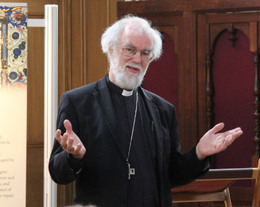Archbishop addresses Anglican Academy and Secondary School Heads

Thursday 22nd September 2011
The Archbishop of Canterbury, Dr Rowan Williams, welcomed the Conference of Anglican Academy and Secondary School Heads (AASSH) to Lambeth Palace.Dr Williams, Patron of AASSH, delivered the keynote address at the conference which had as its theme "Church Schools and Academies: the next 200 years – a Christian response to the world our children will lead". Click here to listen to the address [33Mb].
Speaking in the Great Hall of the Lambeth Palace Library, Dr Williams identified two striking needs in the world of education today, which offered particular opportunities for church schools. The first was the need for the intelligent sharing of resources including spiritual and moral resources; and the second was the need for schools to see themselves as resources for the entire community.
The Archbishop spoke of the importance of setting out a vision of what good religious education can offer society:
“To keep the vision strong, we do need highly professional, imaginative religious education in our schools and in others. As the Archbishop of York remarked in the House of Lords debate after the riots this summer, this is a very odd moment for us to think about thinning-out or dumbing-down the religious and ethical content of school curricula.
To defend the position of religious studies and religious education in this context is not to ask for privileges, it’s simply to ask that we do not have unfair disadvantages landed on us in this respect. The case needs to be made, and needs to be made forcefully. If it’s true, as I thoroughly believe, that the understanding of a past we inherit and the world we inhabit is served by Religious Studies, we have to keep arguing that with energy, with imagination. I believe it can be done.“
Dr Williams also underlined the value of collective worship. “If a school is to be an intelligent community it will always need space to reflect, time to stop, to consider its priorities, to extend its horizons. That is what collective worship is about.” You perform best within an institution, he said, when you realise that the institution exists within a wider world. “A good politician is somebody who knows there is more to life than politics... a good school is a place that acknowledges that school is not everything. You are forming people for a human and civic future. You are helping them to be citizens, to be adults, to be choice-makers, to use their imaginations and their intelligence. When that broad context is clear, then the institution works most creatively - you know the world you’re in.”
The work of church schools is a contribution to the good of society as well as to the pupils themselves, said Dr Williams. "Our committed belief [is] that religious education, in the widest possible sense, is the most deeply humanising enterprise we can be involved in. ... We want to ensure that the education our young people receive is as comprehensive as possible, taking in the widest range of enriching human experiences. That is something we can’t let slip.”
Without us, the Archbishop concluded, the world of education would be a lot smaller and a lot duller, as would the human world itself.
